mongodb 学习笔记
2016-09-22 10:02
357 查看
//验证环境是否支持 if( !extension_loaded( 'mongo' ) ) exit( ' not fonud mongo extentions' . "\n" ); if( !class_exists( 'MongoClient' ) ) exit( 'not support mongo' . "\n" );
//连接数据库
//http://php.net/manual/zh/mongoclient.construct.php
try {
$mongo = new MongoClient('mongodb://127.0.0.1:27017');
}catch ( \Exception $e ) {
exit( $e->getMessage() );
}
//选择数据库test,选择test1 ; 不存在在插入数据自动创建
$collections = $mongo->selectDB( 'test' )->selectCollection( 'test1' );//具体操作,看手册 http://php.net/manual/zh/mongocollection.insert.php //新增数据 $arr = [ 'name' => 'joe', 'age' => 40, 'pages' => 10 ]; //通过设置 insert 的第二个参数 [ 'w' => 0 ],res 返回的是布尔值, $res = $collections->insert( $arr ); var_dump( $res );
返回值:
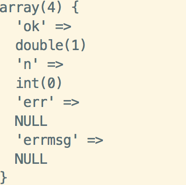
服务器之间查看:

//修改 //直接修改,即找到对应信息,将其直接替换为 new_data; w => 0 也是返回为布尔值,但感觉不好用,第三个参数 upsert 匹配到了则更新,否则新增; multiple 批量 $where = [ 'name' => 'joe' ]; $new_data = [ 'name' => 'joe modify' ]; $res = $collections->update( $where, $new_data, ['w' => 0] ); var_dump( $res );
原数据:

更新后

//使用 $set “用来指定一个键的值,如果这个键不存在,则创建它,这对更新模式或者增加用户定义键 非常方便” $where = [ 'name' => 'joe modify' ]; $new_data = [ '$set' => ['name' => 'joe', 'age' => 39, 'pages' => "10"]]; $res = $collections->update( $where, $new_data, ['w' => 0] ); var_dump( $res );
原数据:

更新后:

//使用 $inc "用来增加已有键的值,或者在键不存在时创建一个键,对于分析数据,因果关系,投票或者其他数据变化的地方,都非常有用" 对int类型结果进行增减 3/+3 是一样的;对字符串类型的进行inc操作,会报异常 $where = [ 'name' => 'joe' ]; $new_data = [ '$inc' => ['age' => +3 ] ]; $res = $collections->update( $where, $new_data ); var_dump( $res );
更新前:

更新后:

//数组修改器 $push “会向已有的数组末尾加入一个元素,要是没有就会创建一个新的数组” $where = [ 'name' => 'joe' ]; $new_data = [ '$push' => [ 'friends' => ['lily','angly', 'mike'] ] ]; $res = $collections->update( $where, $new_data ); var_dump( $res );
更新前:

更新后:
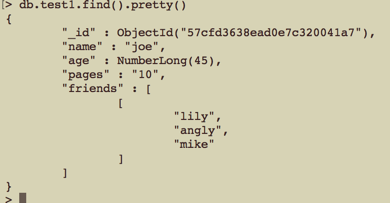
//如果一个值不在数组中就把它添加进去 $where = [ 'name' => 'joe' ]; $new_data = [ '$addToSet' => ['friends'=> 'oby' ] ]; $res = $collections->update( $where, $new_data ); var_dump( $res );
更新前:

更新后:
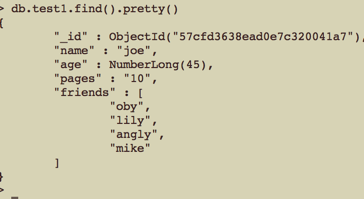
//如果想一次添加多个不存在的值,可以使用each $where = ['name'=> 'joe']; $new_data = [ '$addToSet' => [ 'friends' => [ '$each' => ['a','b','c','oby','lily'] ] ]]; $res = $collections->update( $where, $new_data ); var_dump( $res );
更新前:

更新后:
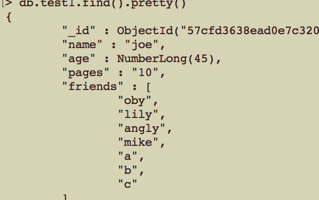
//$pop 从数组的任何一端删除元素 1 表示从数组的尾部剔除一个;-1 表示从数组的头部 $where = ['name' => 'joe']; $new_data = [ '$pop' => ['friends' => 1] ]; $res = $collections->update( $where, $new_data ); var_dump( $res );
更新前:

更新后:
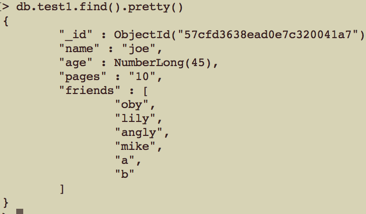
//$pull 根据指定条件,删除数组的成员,pull会将所匹配的成员全部删掉,[1,2,1,1] 如果匹配1,那么数组最后只剩2 $where = [ 'name' => 'joe' ]; $new_data = [ '$pull' => ['friends' => 'lily'] ]; $res = $collections->update( $where, $new_data ); var_dump( $res );
更新前:
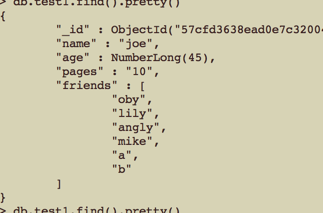
更新后:

//数组定位器 ,用来定位查询文档已经匹配的元素,并进行更新 ,定位符只能更新第一个匹配的元素,如果有多少,只更新第一个 $where = [ 'arrs.a' => 4]; $new_data = [ '$set' => ['arrs.$.a' => 3] ]; $res = $collections->update( $where, $new_data ); var_dump( $res );
更新前:
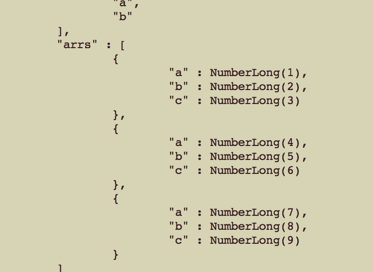
更新后:
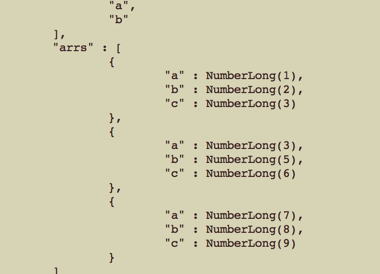
//findandmodify 更新/删除 一个文档 并返回文档 //remove false 表示不删除;new false 表示返回更新前数据,之前没有数据 返回 null;upsert true 如果条件没有找到,则新增 //执行的是新增操作 $where = [ 'name' => 'joe' ]; $new_data = [ '$set' => ['pages' => 400] ]; $res = $collections->findAndModify( $where, $new_data, [], ['new' => false, 'remove' => false,'upsert' => true] ); var_dump( $res );
更新前:

更新后:

//执行的是更新操作 $where = [ 'name' => 'joe' ]; $new_data = [ '$set' => ['pages' => 4] ]; $res = $collections->findAndModify( $where, $new_data, ['name' => 1, 'pages' => 1] ); var_dump( $res );
更新前:

更新后:

//执行的是删除操作 $where = [ 'name' => 'joe' ]; $res = $collections->findAndModify( $where, null, null, ['remove' => true] ); var_dump( $res );
更新前:

更新后:

1 //find 查询操作 http://php.net/manual/zh/mongocollection.find.php 2 //根据条件查找所有 3 $where = ['gender' => 'female']; 4 $res = $collections->find( $where ); 5 var_dump( $res->count() ); 6 7 //指定返回的键 8 $where = ['name' => 'joe']; 9 $fields = ['name' => 1, '_id' => 0]; 10 $res = $collections->find( $where, $fields ); 11 if( $res->hasNext() ) 12 var_dump( $res->getNext() ); 13 14 //$lt $lte $gt $gte $ne 比较操作符 分别是 < <= > >= != 15 $where = ['age' => ['$gt' => 27] ]; 16 $res = $collections->find( $where ); 17 var_dump( $res->count() ); 18 19 $where = ['name' => ['$gt' => 'z']];//字母排序 20 $res = $collections->find( $where ); 21 var_dump( iterator_to_array( $res ) ); 22 23 //$in $nin 范围查询 24 $where = [ 'age' => ['$in' => [29,32,27,28] ] ]; 25 $res = $collections->find( $where ); 26 var_dump( iterator_to_array( $res ) );
//$or 查询 $where = ['$or' => [ ['age' => 27],['name' => 'lili'] ]]; $res = $collections->find( $where ); var_dump( iterator_to_array( $res ) ); //$or 可以包含其他条件语句 $where = [ '$or' => [ ['age' => ['$in' => [32,33,34] ] ], ['name' => 'joe'] ]]; $res = $collections->find( $where ); var_dump( iterator_to_array( $res ) ); //$mod 余数 将查询的值跟第一个数求余,等于第二个数的就被帅选处理 例如 age 为1,6,11 的 $where = ['age' => [ '$mod' => [5,1] ] ]; $res = $collections->find( $where ); var_dump( iterator_to_array( $res ) ); //$not 是元条件j句,即可以用在其他条件之上 $where = [ 'age' => ['$not' => ['$mod' => [5,1]]]]; $res = $collections->find( $where ); var_dump( iterator_to_array( $res ) );
条件句的规则:
如果比较更新修改器跟查询文档,会发现以“$”开头的键处在不同的位置。在查询中,“$lt”在内层文档,而在更新中"$inc"则是外层文档的键。基本可以肯定:条件句是内层文档的键,而修改器是外层文档的键。
可对一个键应用多个条件,例如,查找年龄在20-30直接的用户,可以在age上使用$lt,$gt: $where = [ 'age' => [ '$lt' => 30, '$gt' => 20] ];
一个键可以有多个条件,但是不能对应多个更新修改器。例如 修改文档不能同时包含 [ '$inc' => ['age' => 1], '$set' => [ 'age' => 40] ]
// null null 不仅仅匹配自身,而且匹配“不存在的”,所以这种匹配会返回缺少这个键的文档;如果仅仅匹配值为null,既要检查该键是否为null,还要通过“$exists”p判断该键是否存在 $where = [ 'frind' => [ '$in' => [null], '$exists' => true]]; $res = $collections->find( $where ); var_dump( iterator_to_array( $res ) ); //正则表达式 $where = [ 'name' => new MongoRegex( '/joe/i' )]; $res = $collections->find( $where ); var_dump( iterator_to_array( $res ) ); //查询数组 f是数组的键;a 数组的值;同时也查询出有相关条件的信息 $where = [ 'f' => 'a' ]; $res = $collections->find( $where ); var_dump( iterator_to_array( $res ) ); //$all 通过多个元素匹配数组 ['f' => ['$all'=>['c']]] = ['f'=>'c'] $where = [ 'f' => ['$all' => ['c','d'] ] ]; $res = $collections->find( $where ); var_dump( iterator_to_array( $res ) ); //精准匹配数组的元素 $where = [ 'f' => ['a','b','c']]; $res = $collections->find( $where ); var_dump( iterator_to_array( $res ) ); //查询数组指定位置的元素 $where = [ 'f.2' => 'c']; $res = $collections->find( $where ); var_dump( iterator_to_array( $res ) ); //查询数组的个数 size不能跟其他查询子句组合(比如"$gt")但这种查询可以通过文档中增加一个size键来实现 $where = ['f' => ['$size' => 4]]; $res = $collections->find( $where ); var_dump( iterator_to_array( $res ) ); //$slice 返回数组的一个子集合; 2 表示 前2个;-2 表示 后两个;[1,2] 表示从第一个开始,取两个 $where = [ 'name' => 'joe' ]; $res = $collections->find( $where, ['f' => ['$slice' => [2,2]]] ); var_dump( iterator_to_array( $res ) );
来源:mongodb权威指南
相关文章推荐
- Redhat Mongodb学习笔记
- MongoDB学习笔记5 - 测试查询性能
- MongoDB学习笔记2——创建、更新、查询、删除文档
- MongoDB 学习笔记(python操作)
- MongoDB 学习笔记(纯数据库操作)
- MongoDB学习笔记
- mongoDB学习笔记2--安全认证
- MongoDB学习笔记二 基本概念
- NoSQL数据库之MongoDB学习笔记
- mongodb学习笔记
- Redhat Mongodb学习笔记
- MongoDB学习笔记
- MongoDB 学习笔记
- MongoDB学习笔记(5)--数据导入导出mongoexport
- mongodb 学习笔记五 MapReduce
- MongoDB学习笔记(六) MongoDB索引用法和效率分析
- MongoDB学习笔记-01 服务安装
- MongoDB学习笔记
- MongoDB 学习笔记 之 QueryDocument 查询
- MongoDB学习笔记
